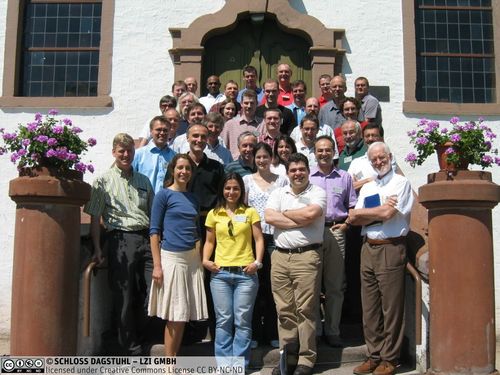Dagstuhl Seminar 06291
The Role of Business Processes in Service Oriented Architectures
( Jul 16 – Jul 21, 2006 )
Permalink
Organizers
- Frank Leymann (Universität Stuttgart, DE)
- Wolfgang Reisig (HU Berlin, DE)
- Satish R. Thatte (Microsoft Corporation - Redmond, US)
- Wil van der Aalst (TU Eindhoven, NL)
Contact
More and more, applications are no longer built from scratch but by integrating pieces of software that have been built independently from each other. As a consequence, the various pieces of an application must be loosely coupled. Service oriented architectures (SOA) provide a general prescription and guidelines of how to loosely couple pieces of application functionality. Web services are a concrete instantiation of a service oriented architecture. Clearly, business processes are essential when aggregating loosely coupled functions into new application functionality. For the combination of business process technology and Web service technology the terms choreography or orchestration has been coined. These technologies are expected to become the foundational layer for tomorrow's information systems and are influencing already many application areas like Enterprise Application Integration, Software Engineering, Systems Management, Data provisioning, BPI, B2B – to name but just a few.
Software vendors today deliver products for modeling and executing choreographies. Research in this area is currently done scattered across different disciplines. The major goal of the seminar is to bring representatives from the different communities (from research, software vendors and users, of business processes and SOA) together for a first stocktaking, a joint in-depth understanding of the issues, to identify and prioritize the main research items, identify standardization needs, and to discuss demanding questions and open problems in detail. The areas to discuss include:
- Modeling Languages and Techniques for Business Processes
- Composition and refinement methods for Business Process Models
- Matching/searching process models
- Processes as constraints/semantics for Web services
- Wiring processes together (i.e. relation between BPEL and WS-CDL)
- Relation between BPEL abstract and executable processes
- Analysis of BPEL specifications
- Different transaction models in BPEL
- Business activity monitoring and process mining in the context of SOA
- Business Processes in Grid Architectures
The seminar clearly improved the understanding of the field of "Business Processes in SOA''. Furthermore, new collaborations between the different communities were triggered by this event.
A substantial part of the week was reserved for interaction other than giving talks and discussions based on these talks. In total four half-day workshops and one panel discussion were organized. The panel discussion was chaired by Satish Thatte and had the title "On the relevance and practicality of process modeling''. Each of the half-day workshops led to interesting insights and fruitful discussions. The results of the workshops are enclosed in the proceedings.
- Egon Börger (University of Pisa, IT) [dblp]
- Christian Brelage (SAP SE - Karlsruhe, DE)
- Alejandro P. Buchmann (TU Darmstadt, DE) [dblp]
- Christoph Bussler (Merced Systems, Inc.- Redwood Shores, US) [dblp]
- Jorge Cardoso (University of Madeira - Funchal, PT)
- Peter Dadam (Universität Ulm, DE)
- Jörg Desel (KU Eichstätt-Ingolstadt, DE)
- Schahram Dustdar (TU Wien, AT) [dblp]
- Oliver Günther (HU Berlin, DE) [dblp]
- Gregor Hohpe (Google Inc. - Mountain View, US)
- Kohei Honda (Queen Mary University of London, GB)
- Stefan Jablonski (Universität Bayreuth, DE)
- Dimka Karastoyanova (Universität Stuttgart, DE) [dblp]
- Ekkart Kindler (Universität Paderborn, DE) [dblp]
- Johannes Klein (Microsoft Research - Redmond, US)
- Matthias Kloppmann (IBM Deutschland - Böblingen, DE)
- Dieter König (IBM Deutschland - Böblingen, DE)
- Carolin Letz (Universität Münster, DE)
- Frank Leymann (Universität Stuttgart, DE) [dblp]
- Niels Lohmann (HU Berlin, DE) [dblp]
- Tiziana Margaria (Universität Potsdam, DE) [dblp]
- Peter Massuthe (HU Berlin, DE)
- Bernhard Mitschang (Universität Stuttgart, DE) [dblp]
- Andreas Oberweis (KIT - Karlsruher Institut für Technologie, DE) [dblp]
- Guadalupe Ortiz (Centro Univ. de Merida, ES)
- Gerhard Pfau (IBM Deutschland - Böblingen, DE)
- Jakob Rehof (Fraunhofer ISST, DE) [dblp]
- Wolfgang Reisig (HU Berlin, DE) [dblp]
- Alan Rickayzen (SAP SE - Walldorf, DE)
- Dieter H. Roller (Universität Stuttgart, DE)
- Christian Stahl (HU Berlin, DE) [dblp]
- Bernhard Steffen (TU Dortmund, DE) [dblp]
- Satish R. Thatte (Microsoft Corporation - Redmond, US)
- Ivana Trickovic (SAP SE - Walldorf, DE)
- Wil van der Aalst (TU Eindhoven, NL) [dblp]
- K.M. van Hee (TU Eindhoven, NL)
- Jussi Vanhatalo (IBM Research GmbH - Zürich, CH)
- Sanjiva Weerawarana (WSO2 Lanka Ltd. - Colombo, LK)
- Mathias Weske (Hasso-Plattner-Institut - Potsdam, DE) [dblp]
- Karsten Wolf (Universität Rostock, DE) [dblp]
- Nobuko Yoshida (Imperial College London, GB) [dblp]
- Uwe Zdun (TU Wien, AT) [dblp]
Classification
- SW-Engineering
- Verification
- Web
- Semantics/Formal Methods
Keywords
- Business Process Management
- Workflow Management
- Middleware
- Service Oriented Architecture
- Web Services
- Petri-Nets
- Transaction Models
- Mega-Programming


